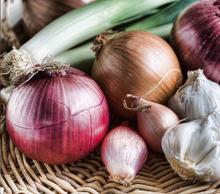Enhancing the Microbiome with PREbiotics

This post was written by Lisa Markley, MS, RDN, who, along with Jill, co-authored the #1 best selling Essential Thyroid Cookbook.
Our digestive system does so much more than just help us to digest and eliminate food.
Our gut is home to our microbiome, a unique collection of 100 trillion microorganisms (gut flora) that inhabits our intestines. The microbiome (nicknamed our “mini ecosystem”) can have a powerful influence over many factors critical for good health such as our immune system, the ability to remove harmful substances from our body, the ability to achieve proper hormonal balance—even mental health.
The lining of our gut is a mighty protective barrier between the foods we eat and microorganisms to which we are exposed. It also has a profound influence on our immune system, which in turn influences our reactions to foods and whether or not we develop food sensitivities, chronic disease, and other inflammatory conditions that can lead to “inflammaging”—the inflammation that causes premature aging.
Imbalances in our gut environment can trigger low-level inflammatory reactions that may be underlying root causes for depression/anxiety, autoimmune diseases, allergies and food intolerances, skin conditions, weight gain/weight loss resistance, and more.
The primary causes of impaired gut health are a poor, nutrient-deficient diet; overuse of antibiotics and other pharmaceuticals; elevated stress; and opportunistic pathogens like yeast and bacteria.
Inadequate intake of probiotic-rich fermented foods and other plant-based foods and the presence of food sensitivities can hinder gut health while antibiotics can wipe out good bacteria and enable unfavorable bacteria to proliferate and take over. In other words, they take the good bugs with the bad.
You’ve likely heard about the importance of eating probiotic-rich foods such as yogurt and cultured/fermented vegetables to inoculate our gastrointestinal tract with the beneficial bacteria that play an important role in digestive and immune health.
But have you heard about prebiotics?
Being mindful of probiotics and fermented foods is simply not enough to keep our guts healthy. We should also be feeding those bacteria so they can survive and thrive.
That’s where prebiotics come in.
Prebiotics are non-digestible fibers found in certain foods (many of which you’ll find in our Essential Thyroid Cookbook!) that enhance the microbiome by fertilizing and stimulating the colonization of healthy bacteria. They work synergistically with probiotics to promote healthy gut function.
By feeding the colonies of healthy bacteria, prebiotics help to increase microbial diversity and improve the ratio of good to bad bacteria.
Unfortunately, the standard American diet (SAD), high in processed ingredients, additives, preservatives, and other chemicals doesn’t provide nearly enough prebiotic foods (or probiotic foods, for that matter) that can cause imbalances in gut function and overall health.
When our good bacteria don’t get enough prebiotic foods, they start to feed off the colon’s mucosal lining. Lacking appropriate nutrition, beneficial microorganisms grow frail and become unable to ferment prebiotics. This creates an environment for acid-sensitive bacteria—like strains of E. coli and salmonella, as well as other potent pathogens—to bloom.
The proliferation of harmful bacteria can set off a microbial imbalance, known as dysbiosis, and lead to problems such as leaky gut/intestinal permeability. This in turn can trigger autoimmune disease and metabolic disorders.
So where are prebiotics found?
Fructooligosaccharides and inulins are two main types of prebiotics. They’re found in varying amounts in foods such as:
- Chicory root
- Jerusalem artichoke
- Garlic
- Leeks
- Onion
- Dandelion greens
- Asparagus
- Jicama
- Unripe bananas
Resistant starch is another type of prebiotic that has been shown to improve insulin sensitivity in addition to supporting healthy digestion. It’s found in cooked, cooled potatoes, unripe bananas, cashews, and beans.
Here are some ways to enjoy some prebiotic foods:
- Drink a coffee like beverage made from chicory root.
- Add chopped Jerusalem artichoke to a vegetable stir-fry or pan of roasted vegetables.
- Season your meals with garlic, leeks, and/or onions.
- Enjoy sautéed dandelion greens seasoned with garlic.
- Shave fresh asparagus into fresh salads or toss in a little olive oil and roast in the oven.
- Add fresh jicama to salads—jicama is not only delicious, but also provides a unique/crunchy texture.
- Enjoy bean soups or add a scoop of beans to your salad.
If you’re not already consuming prebiotic rich foods on a regular basis, you may want to introduce slowly to allow your gastrointestinal tract time to adjust, as overdoing may cause abdominal bloating and discomfort.
In time, you’ll be reaping the benefits of the synergistic relationship between prebiotics and probiotics!
Add comment